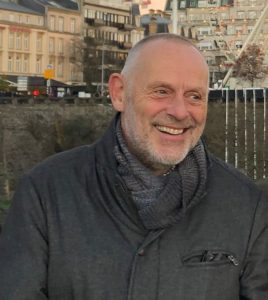As stress goes viral
How can we do something about ‘stress,’ which is booming worldwide? And also here, in ‘This lovely quiet rose-growing part of dirty old Europe,’ as James Joyce said.
Do an internet search for stress in Luxembourg, and you will immediately see more than 100 organizations/companies offering stress management. Look at international studies on the subject and how ‘we’ firmly participate in stress at home and work. If we talk about percentage, we can say that three-quarters of the population in ‘the West’ is or will be dealing with stress. If this continues, people without stress will start to feel uncomfortable (‘OMG, am I lazy …?’).
Even though some ‘smaller’ surveys show that it might not be that bad in our country (seedbox.lu), research by the uni.lu shows that especially the ‘Covid-period,’ with the lockdowns, has caused much mental distress in Luxembourg. The main question is: how can we do something about this for the people who suffer from it and certainly also for society, which undergoes severe damage as a result? The figures circulating in the world about the cost of “stress” are stunning—a severe ‘stressor’ for those who must keep an eye on state finances.
So, what are we talking about?
What is stress? There are many scientifically sound descriptions, but stress is not a good term for scientists because it is such a highly subjective phenomenon that it defies definition. If you can’t define stress, how can you possibly measure it? The term “stress,” as it is currently used, was coined by Hans Selye in 1936, who defined it as “the non-specific response of the body to any demand for change.” While everyone can’t agree on a definition of stress, all the experimental and clinical research confirms that the sense of having little or no control is always distressful – and that’s what stress is all about. (American Institute of Stress)
The UK Health and Safety Executive” defines stress as ‘the adverse reaction people have to excessive pressures or other types of demand placed on them.’
What are the drivers of stress? Perhaps a more straightforward topic. Fill in the blank, … financial problems, family woes, work tension, health, loneliness, … you name it. And then we have war, mobility, climate, … All those things diametrically opposed to the carefree feeling suggested by a selfie at an infinity pool.
We assume in this story safely that many people can recognize themselves in the above. More important than a watertight description of the problem is finding a solution. Again, you can ask ‘doctor google’ the question, and there will be a long series of “the 12 best”, “the five best,” the “7 best”, and so on remedies.
—————
Let’s talk about stress, baby.
Stress is not a virus for which there is a vaccine. But we do need to address it urgently. In our dreams, poems, and protest songs, we are gently changing the world and how we treat each other. In reality, we rely on our immediate environment for understanding and support. So why not in the neighborhood where we live? Take it easy and relax. Maybe we can talk about it if almost everyone is struggling with something.
In Waldbredimus, between Remich and the city of Luxembourg, residents gathered, at the initiative of Stephane Ndzie, to philosophize about stress and burnout in the luscious atmosphere of this endless summer.
Sunday morning around ten o’clock, in the garden of Isabel and Dan. Everyone is welcome. The garden doors are open. People bring friends. Paul Schonenberg, for example, is also invited. For him, this initiative fits right in with the idea that everyone can do something. He says: “Mostly all of us do not know how powerful small gestures can be and how much impact we can have.”
The ‘Today’ program is stress-free: starting with a vigorous fitness program and then, over brunch, a conversation about stress and burnout. The group is heterogeneous, and we should point out that there will be several ‘specialists’ in the field. So, some expertise is present.
The first topic of discussion: what are the most common forms of stress in Luxembourg?
The most stressful events include:
- Death of a loved one
- Divorce
- Moving
- Major illness or injury
- Job problems/loss
- Finance/Financial issues
- The future (of climate, war …)
- Living in a multi-cultural / linguistic Luxembourg
- ….
(Note for the reader: If there is more specific Luxembourg-related stress, please notify us. And preferably add a remedy!)
Again, look it up; different sources contradict each other. Is there a lot or little stress in this country now? One study says yes, and another says it is much less stressful here than elsewhere. A tricky start if you’re stressed. Because this says above all that it’s all not so easy to put into words. And all that stuff with all those rankings about who lives best doesn’t relax either. Before you realize it, you are busy with ‘competition living.’
Stéphane points out that the basis remains good health and that almost everyone can do something about it for themselves. Everyone knows that living with a physical disability can be very stressful; think of mobility. But these people also benefit from adapted training, exercises, and appropriate support.
The physical condition can cause stress (overweight, obesity, anorexia, etc.)
We’re talking about weight, diet, and food at the eclectic breakfast. Recent research by neuroscientist Tracy Bale of the University of Pennsylvania shows that stress can also cause weight gain. Stress, because of hassles with all kinds of diets, often leads to disappointment.
‘Stress causes the body to release the hormone cortisol, which fuels the blood with energy in the form of sugar, enabling us to flee from potential dangers. Over time, high-stress levels lead to chronically elevated cortisol levels that can cause increased appetite and weight gain.’ Trace Bale
Getting pleasure from a bit of exercise and some fitness is maybe an interesting ‘beginning’ of a break from stress. The nice thing about this meeting in the garden is that we also do some exercises. We are led by Stephane, a former professional boxer in Canada and the USA with experience as a top sports coach. He talks about the differences between preparing for a competition and freeing your body and mind from tension. We take this ‘training’ seriously and have fun doing it while laughing at our lack of agility.
By the way: smiling or laughing is a sign that we want to connect .. (Scientific American, 9 Feb. 2020)
You immediately see that some people handle it with more self-confidence than others, which brings us to another reason for stress; according to Stephane: many people lack self-confidence. This lack of self-confidence is a cause of anxiety, concerns, emotional instability, physiological dysfunction, etc.
A classic situation wherever you live and work. Some people have more self-confidence than others; how do we deal with each other? And how do we discuss this in this multilingual country? Some people have a complete command of several languages, but some people think, know or realize that they are not quite the same person in another language. If you have much social success with your humor in your mother tongue, it doesn’t have to be the same in another language. And there goes your self-confidence and thus susceptibility to stress. (‘he used to be funny, now he’s fat’)
Isabel, the psychiatrist, points out the degrees of stress. She is a remarkably calm listener. In conversations about our mental well-being, the presence of a psychiatrist keeps us from saying “just anything, Always good, of course.” There is a vast difference between being very busy and losing your temper or suffering from it. Some people can succumb to stress or burnout and need medical help, and fitness and a healthy diet are not enough. Her deontology does not allow us to talk about specific patients, of course, but the bottom line is that we should try to recognize in time when something (including stress and burnout) is in danger of going off the rails. And in practice, this is only possible if we dare to discuss these themes on a social level. Trust each other at every level of society.
Talk about it! With that, we arrive at our largest material treasure, which is poorly exploited in this nation: the enormous number of interesting people from different backgrounds. Not only in the larger city but also in, the smaller villages. A ‘mix,’ which, if you listen to each other, leads to ‘multiple perspectives, from which you can tackle problems and inconveniences.
The Luxembourg authorities would do well to facilitate places where people can meet. Support the emerging Tiers Lieux and encourage people to take responsibility locally for their own and each other’s well-being.
This, too, is participating in society. Call it taking on social responsibility, but most of all, it is inspiring and fun. You can label it, but it comes down to ‘doing things. Not just watching and waiting.
That is, opening your garden, like Isabel and Dan. Or giving a workout for free on Sunday mornings, like Stéphane. It inspires people.
We see more and more similar initiatives around us. You can give it a sociological explanation, the Ripple Effect, see a development or a trend in it, or enjoy it.
Paul: “This idea of ‘ripples’ actually has many other names. It is also the idea behind the concepts of “paying forward,” “random acts of kindness (RAK),” and “planting a seed”…Regardless of the label we put on it… it all embodies the same concept of living in an interconnected world and making this interconnected world a better place through the role you play in it by your actions. People think they are unimportant, and their actions do not make a difference. This is rubbish… every one of us can be a powerful change agent…. if we make an effort to do that. So take a deep breath, jump in the water, and swim. Make the world a better place by your one act of kindness.”
Il faut cultiver son Jardin….
(Avec les voisins …)
Some of us are convinced, that you can get everything out of yourself, that you can do it all on your own. That there are ‘methods’ for that. And that you have some kind of assignment to ‘succeed’ in life. Or that life is largely a solo performance. While others say, that you have to keep listening to your ancestors. That you are just a part of a much bigger picture. Or that you should take the time to do nothing for a while too, being bored can be healthy. (The Guardian 4 May 2020)
Ideas are discussed in different languages, in a bouillabaisse of words, with neighbors from around the world. When everyone’s tongue is linguistically tangled, we go to spar with Stéphane for a while. We get boxing gloves on, and we get to enter the ring one by one. Everyone joins in.
I am, almost 70, doing my best to ‘make’ an Ali Shuffle on the grass like my great hero Muhammad Ali … Not successful? No stress … We talk some more; the afternoon ends… A glass of ‘Schampes’? Why not.
A few people say: we are going for a swim in a lake near Nennig in Germany. Stephane smiles. Until next time … and meanwhile
Take it easy
Take it easy
Don’t let the sound of your own wheels drive you crazy.
(Glen Frey/Jackson Browne)
|
|
|


